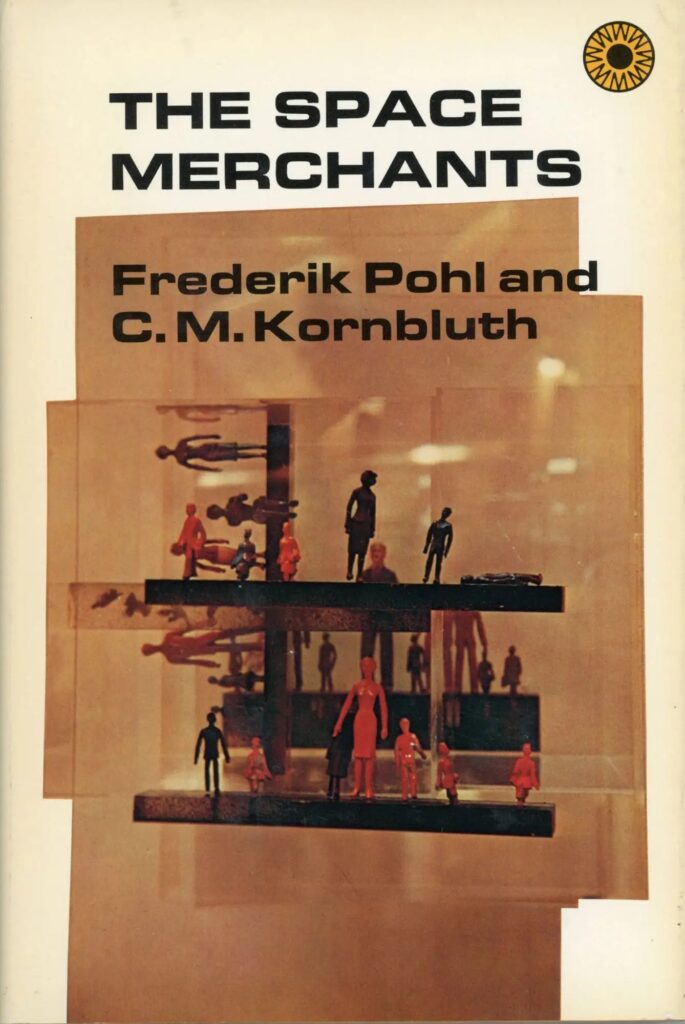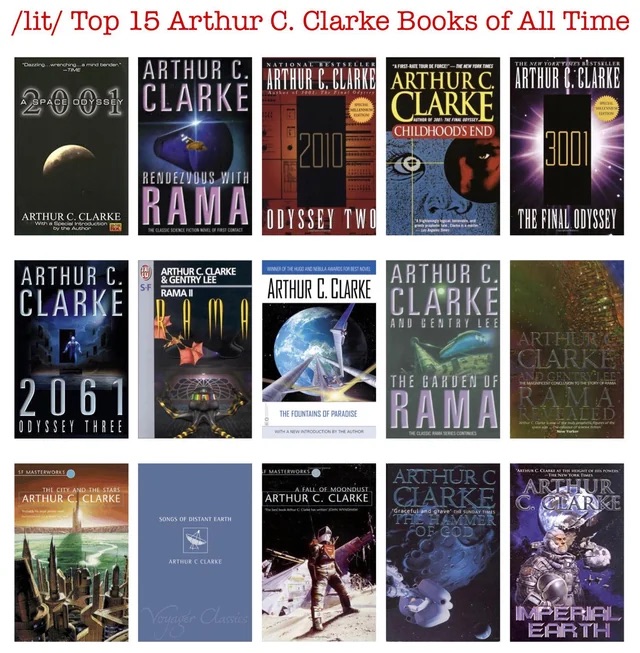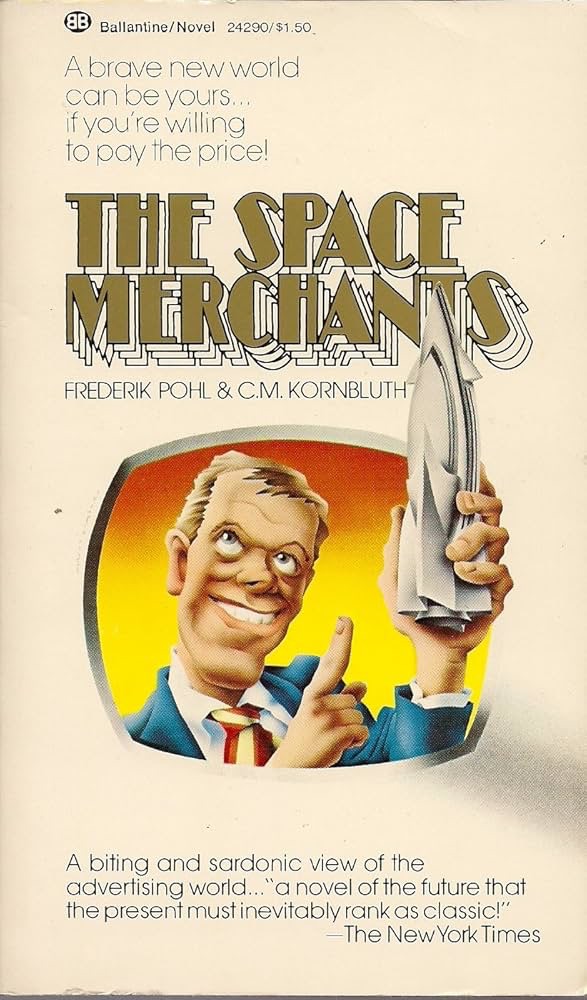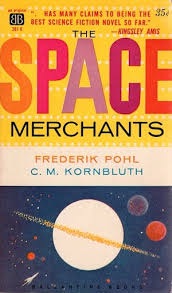
The Space Merchants—a book that captures today’s farcical present and inevitable future better than any Orwellian or Huxleyan fever dream. Forget 1984; this is a world where satire from 20 years ago gets picked up by the tech industry and polished into grim reality. What was once a joke is now a business model, and what was once a warning is now a quarterly strategy meeting.
By now, it’s obvious that the tech industry is less a bastion of innovation and more a godforsaken clown car, careening down the information superhighway while vomiting buzzwords like “acceleration”, “AI” “synergy” and “blockchain.” The whole mess is a recursive satire of itself, a Möbius strip of idiocy where last decade’s parody becomes this year’s mission statement. It’s Silicon Valley’s greatest magic trick: turning late-night satire sketches into venture capital pitch decks.
Take the rise of the “metaverse.” What started as a dystopian joke in Snow Crash by Neal Stephenson—a world so unbearable we had to digitize our misery—has now been Frankensteined into existence by Zuck and friends. Never mind that no one asked for a corporate-sponsored Second Life reboot; they’re too busy selling us digital real estate, NFTs of fake sneakers, and virtual workspaces where avatars fumble through PowerPoint presentations like acid-tripping Sims.
Then there’s the gig economy. Remember when The Onion joked about Uber offering rides on piggyback to save costs? Fast-forward a few years, and DoorDash drivers are practically paying for the privilege of delivering your cold Pad Thai, all while their app begs them to “rethink” their $2.50 tip. Every dystopian headline about these companies feels ripped from South Park: “Amazon Tests Drone Delivery by Dropping Packages on Homeless Camps—50% Accuracy Rate Declared a Success.”

Artificial intelligence is the real crown jewel of this lunacy. What was once the nightmare scenario of 2001: A Space Odyssey is now the selling point for every tech startup. “The machine will take your job!” they say, with a grin so wide you can hear the stock options jingling in their pockets. But the AI they’re so proud of? It seems to be only helping people they don’t really like, writers, editors and journalist and their half-baked recipes and nonsense essays while not really making jobbers any wiser. Meanwhile, the “jobbers” it’s meant to enlighten are left just as clueless as ever, proving that even the future’s smartest tools are still dumb enough to miss the point.
And let’s not forget Elon Musk, the industry’s high priest of self-parody. He’s like a Bond villain written by Reddit, launching flame-throwers and tweeting crypto scams while promising to terraform Mars. The man is a walking Saturday Night Live skit, except he’s real, and he’s somehow convinced the world to treat him like a messiah instead of the world’s most expensive meme generator.
These bastards don’t want to innovate—they want to outdo each other in a game of techno-jester brinkmanship! The next 20 years will bring us robo-lawnmowers with ads on their screens, blockchain funerals, and emotional support drones programmed to tell you your father really did love you! The future of space isn’t bold explorers or visionary scientists; it’s Space Merchants hawking cosmic toothpaste and Moon-themed protein bars. Imagine it: astronauts proudly unfurling banners not for humanity, but for the “Pepsi Zero-G Experience,” while Jeff Bezos unveils Amazon Lunar Prime—guaranteeing next-day delivery of oxygen tanks, assuming you survive the shipping fees. And let’s face it, the first structure on the Moon probably won’t be a research station. It’ll be an Amazon warehouse with drones zipping around faster than a rocket launch, ensuring that even in space, your one-click addiction follows you.
Because let’s be honest—if the cold, efficient pragmatism of an Arthur C. Clarke universe collided with the bloated bureaucracy of our reality, the scientists wouldn’t just lose their jobs; they’d be relegated to gig economy serfdom, side-hustling between adjunct lectureships and data-entry freelancing on Fiverr.

Picture it: Dr. Heywood Floyd, instead of riding a Pan Am shuttle to the moon, is stuck at a community college teaching Introduction to Space Science to a room of TikTok-addicted freshmen, hoping his next course evaluation doesn’t torpedo his contract. Meanwhile, Dave Bowman—astronaut and theoretical physicist extraordinaire—is reduced to analyzing corporate KPIs for Amazon’s new orbital warehouses.
HAL 9000? Oh, he’d have a job, all right—automating HR decisions and writing passive-aggressive rejection emails to underemployed PhDs applying for “entry-level” positions requiring 10 years of experience.
The dystopian twist on Clarke’s utopia practically writes itself. In a world where basic research fights for crumbs against trillion-dollar ad-tech and space-mining oligarchs, the explorers of Rendezvous with Rama would spend more time groveling for corporate sponsorships than investigating alien megastructures. Any attempt to propose something revolutionary would be met with the dead-eyed stare of an Amazon middle manager muttering, “That doesn’t align with our quarterly KPIs. Have you considered developing a more efficient packaging algorithm?”
Even the aliens wouldn’t bother contacting us. Why waste time with a species that lets its brightest minds teach six courses a semester for $25,000 a year while tech bros are celebrated for inventing subscription-based refrigerators?
Tech’s greatest irony isn’t that it’s overtaking satire. It’s that it’s not even good at it. Satire requires wit and creativity, not a bloated venture capitalist with a God complex. The only thing the tech industry innovates is the art of being insufferable—and it’s doing a damn fine job at that.

THE SPACE MERCHANTS
The book that nails 2025 on the head isn’t 1984 or Brave New World—it’s The Space Merchants. We’re not living in a dystopia of surveillance or soma-fueled complacency; we’re living in the grinning, grease-slick hellscape of corporate colonization. There’s no need for Orwellian nightmares or Huxleyan hedonism when you’ve got The Space Merchants, a book so surgically precise it feels like Frederik Pohl and C.M. Kornbluth—are the patron saints of acid wit—stole the blueprint for the 21st century and decided to play it for laughs. Except the joke was on us.
The world is no longer run by governments or ideologies; it’s run by marketing departments with the moral backbone of a jellyfish and the self-awareness of a goldfish. Politicians are just mascots now, soft-selling trillion-dollar subsidies to the equivalents of SpaceX, Amazon, and a dozen other megacorps that suck the marrow out of the planet while running ads about sustainability.
The only real difference between The Space Merchants and our current reality is the dress code—and the women. Every character in The Space Merchants feels like they’re auditioning for Mad Men in space—smooth-talking, chain-smoking dealmakers with an arsenal of backhanded compliments and a firm belief that advertising is destiny The men oozed self-importance, while the women, though written in as afterthoughts, were crafted with an edge that hinted at power they were never allowed to wield.
Today’s hustlers? They’ve ditched the suits for “authenticity”: Aviator Nation jackets, hoodies, and whatever passes for paleo-tech chic. Don’t mention the Patagonia vest; it’s lurking in the closet, waiting to remind you that “relatable” is just another marketing ploy.
In the Space Merchants itself science has been reduced to another cog in the advertising machine. Every discovery is just a stepping stone to a new product launch. Forget curing cancer—there’s no profit in that when you can develop a cancer-adjacent “cure subscription plan” instead. Scientists are no longer innovators or dreamers; they’re corporate drones in lab coats, paid just enough to keep the patents flowing but not enough to escape their student debt.

And the working stiffs in this grand carnival of corporate feudalism? They’re not citizens—they’re marks. The human race has devolved into two groups: the consumers, who exist solely to buy garbage they don’t need, and the corporate overlords, who crank out this garbage with the glee of mad scientists.Every moment of their lives is an “grift opportunity” tracked and monetized by some program that knows their bathroom schedule better than their own mothers. The corporations don’t sell products anymore; they sell realities, and they buy them with every click, every swipe, every goddamn piece of our souls we trade for convenience.”
Here’s the setup: Earth is a shithole, ruled by corporations so massive they’ve replaced governments, religions, and any remaining shred of human decency. Advertising isn’t just a tool—it’s the ultimate weapon, shaping reality itself. Our protagonist, Mitch Courtenay, is an elite copywriter tasked with selling humanity on colonizing Venus—a toxic hellscape that only an ad agency could spin as a paradise.
Our guide through this capitalist hellscape is Mitchell Courtenay, a top-tier ad man at Fowler Schocken, the most powerful agency in the world. His new assignment? Sell colonization of Venus to a population so brainwashed they’ll eat literal reprocessed garbage if you slap the right logo on it. Venus, by the way, is a deathtrap—uninhabitable, lethal, and about as appealing as living in the exhaust pipe of a diesel truck. But that doesn’t matter. Mitchell’s job is to make the suckers believe it’s paradise, and the suckers, naturally, lap it up.
Things go sideways when Mitchell gets tangled up with the Consies—a scrappy underground resistance movement that’s somehow managed to survive in this nightmare world. They’re fighting for… what? Clean water? Less garbage in the food supply? Something human, at least. Mitchell is yanked out of his cushy corporate life and dumped into the very trenches his ads exploit, forcing him to confront the machine he’s helped build.
And what’s the solution to this corporate nightmare? A cynical, high-concept shrug dressed up as a revolution: sabotage the system by embracing the same cynical manipulation that got you into this mess in the first place.
Because, let’s face it, Pohl and Kornbluth weren’t idealists—they were realists with a mean streak. They knew that humanity wasn’t going to save itself with hope or morality. No, their solution is high-concept cynicism: beat the system by out-hustling it. Turn the same tricks, tell the same lies, but aim them at the machine instead of the masses. Mitch’s arc isn’t about enlightenment or rebellion—it’s about recalibrating his target audience.
Take the Consies, the eco-terrorist movement in the book. They don’t inspire Mitch with some grand moral truth. They recruit him by appealing to his bruised ego and dangling the same carrot the corporations used: power. It’s cynicism weaponized as strategy, and it works because, in a world ruled by marketing, the only way to beat the pitch is to make a better one.
And that’s the real gut-punch of The Space Merchants. It doesn’t offer a way out of the nightmare—it offers a way deeper in. Mitch’s final revelation isn’t that the system is broken, but that he can sell a better lie. It’s not redemption; it’s adaptation. And isn’t that exactly what we see today? Tech companies spinning promises of utopia while charging monthly subscriptions for basic survival, activists branding their movements like startups, and everyone hustling to stay one step ahead of the collapse.
Karl Rubin and Paul didn’t believe in heroes. They believed in survivors, hustlers, and con artists—the only people who thrive in a world where cynicism isn’t just a defense mechanism but a survival skill. Their solution isn’t to tear down the system—it’s to play the game so well that you rewrite the rules.
So here we are, living their nightmare. Venus is still uninhabitable, but who cares? Mars will do just fine, and there’s no shortage of Mitch Courtenays ready to sell us the dream. The Consies of today aren’t blowing up pipelines; they’re launching greenwashing campaigns with better graphics. And the corporations? They’re still running the show, grinning as they sell us the same lies dressed in new logos.
Karl Rubin and Paul are probably laughing somewhere, watching us prove them right. Because in the end, their high-concept cynicism wasn’t just a solution—it was a prophecy. Let’s not beat around the bush: The Space Merchants isn’t just a novel—it’s a goddamn manual. A step-by-step guide to the gleaming, hollow machine of late-stage capitalism. If you’ve ever wondered how to sell a dream to a population so beaten down they’ll eat recycled garbage with a smile, this is your book. It’s not satire anymore; it’s a how-to guide for the grifters running the show.
Pohl and Kornbluth didn’t just write a dystopia—they wrote the Bible for the 21st century grift. This isn’t a warning; it’s a blueprint. Welcome to the machine, where the only rule is: create a subscription model for everything, including the soul, and make sure the packaging looks good while you do it.